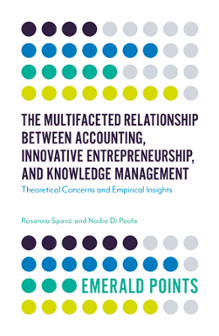
Index
Rosanna Spanó
(University of Naples Federico II, Italy)
Nadia Di Paola
(University of Naples Federico II, Italy)
ISBN: 978-1-78769-060-8, eISBN: 978-1-78769-057-8
Publication date: 7 June 2019
This content is currently only available as a PDF
Citation
Spanó, R. and Di Paola, N. (2019), "Index", The Multifaceted Relationship Between Accounting, Innovative Entrepreneurship, and Knowledge Management: Theoretical Concerns and Empirical Insights, Emerald Publishing Limited, Leeds, pp. 107-111. https://doi.org/10.1108/978-1-78769-057-820191002
Publisher
:Emerald Publishing Limited
Copyright © 2019 by Emerald Publishing Limited
INDEX
Accounting
, 1
contribution to entrepreneurial pathway
, 46–50
innovation challenges
, 35–45
knowledge management challenges
, 29–45
relationship between entrepreneurship and
, 53–55, 74–77
Action learning strategies
, 33
Ajzen’s theory of planned behavior
, 2–3
American Institute of Certified Public Accountants (AICPA)
, 45
Behavioral
beliefs
, 19–20, 62, 78
studies relevance to relationship between accounting and entrepreneurship
, 53–55
Bootstrapping-oriented behaviors
, 14
Business
creation process
, 16
plan
, 16
plan content analysis
, 74–77
Chartered Global Management Accountant (CGMA)
, 45
Chartered Institute of Management Accountants (CIMA)
, 45
Cluster analysis
, 63
Combination pattern
, 31–32
Commercial stakeholder
, 48
Compartmentalized approaches
, 56
Condition
necessary
, 61
sufficient condition
, 61
Configurational analysis
, 60–61
Control beliefs
, 19–20, 57–58, 62
Control systems
, 27, 38
“Creative destruction” mechanism
, 7
d-Dev Adventure
, 68–71
Data mining
, 33
Decision-making process
, 13, 21, 36
Economic
accountability
, 67
system
, 40
theories
, 9
El-kit
, 68–69
Emotional component
, 15
Employee creativity
, 34
Entrepreneur(s)
, 11
business ideas
, 66–67
in business plan
, 16–17
capacity
, 48
characteristics
, 46–47
homogeneous groups of
, 8–9
individual level
, 6, 12
management experience
, 79
personal traits
, 15
potential
, 16, 24–25
women
, 21
Entrepreneurial/entrepreneurship
, (see also Innovative entrepreneurship), 10, 28, 53
accounting contribution to entrepreneurial pathway
, 46–50
action
, 7, 12–17, 62, 65–66
adventure
, 28
alertness
, 13
behavior
, 10–11, 17, 53–54
case studies
, 66
context
, 67
d-Dev Adventure
, 68–71
domain
, 27
event model
, 18, 54
firms
, 6, 9
individuals
, 15
innovation and control relationship
, 27–50
intentions
, 17–24, 62, 65
methodology
, 60–63
motivation
, 17–24
Olo Adventure
, 71–74
orientation
, 12–17
process
, 11, 49
relationship between accounting and
, 53–55, 74–77
spirit
, 7
Explicit knowledge
, 29, 31–32
Externalization
, 32
Extrinsic motivations
, 23, 57
Financial bootstrapping
, 14–15
Financial considerations
in business plan analysis
, 76
in coding categories
, 75
Financial stakeholder
, 48
Fuzzy-set QCA methodology (fsQCA methodology)
, 3, 60–61, 63–66
Global Management Accounting Principles
, 45
Goal-directed behavior model
, 23
Healthcare innovation
, 73
Ideal model
, 43
Individual behavioral beliefs
, 57
Individual motivational relevance
, 61
Information technology
, 32
Innovation
, 38, 48
challenges
, 35–45
contribution of accounting to entrepreneurial pathway
, 46–50
and control relationship
, 27–28, 29
ecosystems
, 11
knowledge management challenges
, 29–34
process
, 27–28
Innovative entrepreneurship
, 1, 3, 5
entrepreneurial action and orientation
, 12–17
entrepreneurial intention and motivation
, 17–24
pathways to
, 7–12
Innovators
, 36
Institutional stakeholder
, 48
Intensive knowledge creation activities
, 28
Interaction pattern
, 31–32
Internalization pattern
, 31–32
Intrinsic motivation
, 23, 56–57, 70–71, 73, 77, 79
Key performance indicators (KPI)
, 40
Knowledge
, 29, 48
entails
, 29
integration processes
, 28, 33
knowledge-based view
, 31
sharing/integration
, 33
transfer
, 28
Knowledge management (KM)
, 1–3, 28
challenges
, 29–34
Knowledge-intensive
domains
, 28–29, 51
organizations
, 38
settings
, 33–34
Levers of Control Framework (LOC Framework)
, 40
Management accounting systems
, 2, 28–29, 34, 38
Management control systems
, 39, 51
Market
, 7
business plan analysis results
, 76
coding categories
, 75
orientation
, 72–73
Motivations
, 6, 56
entrepreneurial
, 22–23, 62
individual
, 34
intentions
, 66
intrinsic and extrinsic
, 23
mediating role
, 57
Normative beliefs
, 19–20, 57, 62, 64–66, 78
Olo Adventure
, 71–74
Operations
, 47, 74
business plan analysis results
, 76
coding categories
, 75
routine
, 35
Opportunity-motivated actions
, 12–13
Organic structure
, 37
Organizational knowledge creation theory
, 31
Perceived behavioral control
, 19, 56, 58, 78
Performance management system (PMS)
, 2–3, 39, 42, 44–45, 51
Personal attitudes
, 57–58
Policy makers
, 6–7, 29, 55, 67, 79–80
Post-launch phase
, 11
Post-QCA analysis
, 55, 58–59
Pre-launch phase
, 11
Product/service
, 75–76
Qualitative comparative analysis (QCA)
, (see also Fuzzy-set QCA methodology (fsQCA methodology)), 55
methodology
, 60–63
research design
, 58–60
set-theoretic method
, 55, 58–59
solution
, 66
Quality
, 67
of business plan
, 47
decision making
, 45
Research design
, 55, 58–60
Scepticism
, 28
Scholars
, 6–7, 9, 12, 15, 17, 21
with entrepreneurial experience
, 58
management
, 69
Scientific research
, 68
Socialization
, 31–32
Stakeholders
, 7–8, 16, 46–47
external
, 48
primary and secondary
, 10
Strategy
, 39, 74–76
Subjective norms
, 19, 56, 59, 78
Sustainability
, 67
Tacit knowledge
, 29, 31–32
Team characteristics
, 74–76
Technological innovation
, 68
Theory of Planned Behavior (TPB)
, 2–3, 19–21, 23, 54
application
, 25
relevance
, 55–58
Theory of reasoned action
, 19–20
Value creation processes
, 31, 45
Virtual teams
, 33